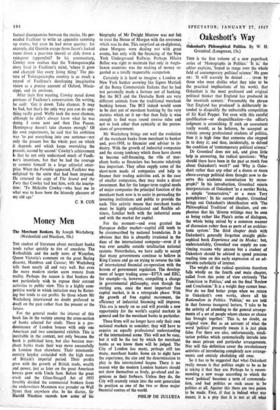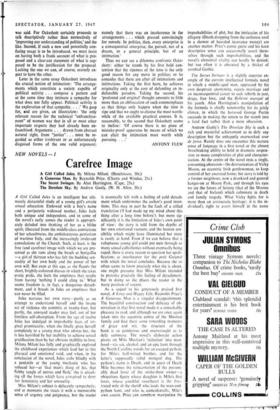Oakeshott's Way
Oakeshott's Philosophical Politics. By W. H. Greenleaf. (Longmans, 15s.)
THIS is the first volume of a new paperback series of 'Monographs in Politics.' It is,' the editor explains, 'hoped to range over the whole field of contemporary politicarscience.' He goes on: 'It will scarcely be denied . . . (even by those who most dislike what they take to be the practical implications of his work), that Oakeshott is the most profound and original political thinker that England has produced in the twentieth century.' Presumably the phrase `that England has produced' is deliberately in- tended to disqualify the unbeatable competition of Sir Karl Popper. Yet even with this careful qualification—or disqualification—the editor's judgment is astonishing. If such an assessment really would, as he believes, be accepted as truistic among professional students of politics, then it is high time that someone else stepped in to deny it; and thus, incidentally, to defend the condition of 'contemporary political science.'
Dr Greenleaf does not ask, and gives little help in answering, the radical questions: 'Why should there have been in the past so much fuss about Oakeshott's work?' and 'Why is Oake- shott rather than any other of a dozen or more above-average political dons thought now to de- serve this academic canonisation by mono- graph?' In his introduction, Greenleaf rejects interpretations of Oakeshott 'as a secular Burke, a simple "conservative," or a mere Tory pamphleteer.' In his second chapter, Greenleaf brings out Oakeshott's identification with 'The Philosophical Tradition' of idealism, and em- phasises that his 'diverse writings may be seen as being rather like Plato's series of dialogues, the whole being united by a common manner of discussion rather than as parts of an architec- tonic system.' The third chapter deals with Oakeshott's generally forgotten straight philo- sophical book Experience and its Modes: but, understandably, Greenleaf can supply no con- vincing reasons why anyone but a student of Oakeshott should be advised to spend precious reading time on this early expression of an ad- mirable catholicity of interest.
The weight of the radical questions therefore falls wholly on the fourth and main chapter, called from this point of view curiously 'The Transition to Politics,' and on the final 'Review and Conclusion.' It is a weight they cannot bear. Nor do we find better props when we return to Oakeshott's own works, above all his Rationalism in Politics. 'Politics,' we are told in that famous inaugural lecture, 'I take to be the activity of attending to the general arrange- ments of a set of people whom chance or choice has brought together.' This is, no doubt, an original view. But as an account of what the word 'politics' presently means it is just plain false. For there are also, unfortunately, totali- tarian politics which systematically intrude into the most private and particular arrangements. Nor will this definition cover the revolutionary activities of introducing completely new arrange- ments and entirely abolishing old ones.
So it has to be suggested that what Oakeshott really means is that politics ought to be as he is taking it that they are. Perhaps he is recom- mending a new usage according to which the word 'political' becomes a term of commenda- tion, and bad politics as such cease to be politics at all. Against this there are two points to be made. First, if that is indeed what was meant, it is a pity that it is not at all what
was said. For Oakeshott certainly proceeds to talk descriptively rather than normatively of `improving our understanding of politics,' and the like. Second, if such a new and potentially con- fusing usage is to be introduced, we must insist on having both a frank account of what is pro- posed and a clear-cut statement of what is sup- posed to be the justification for the proposal. Lacking the one we can, of course,' scarcely ex- pect to have the other.
Later in the same essay Oakeshott introduces the crucial notion of intimation: 'The arrange- ments which constitute a society capable of political activity . . . compose a pattern and at the same time they intimate a sympathy for what does not fully appear. Political activity is the exploration of that sympathy. . . . We gasp for, and are given, an illustration: 'the only relevant reason for the technical "enfranchise- ment" of women was that in all or most other important respects they had already been en- franchised. Arguments . . . drawn from abstract natural right, from "justice". . . must be re- garded as either irrelevant or as unfortunately disguised forms of the one valid argument;
namely that there was an incoherence in the arrangements . . . which pressed convincingly for remedy. In politics, then, every enterprise is a consequential enterprise, the pursuit, not of a dream, or a general principle, but of an intimation.'
Thus we can see a dilemma confronts Oake- shott: either he stands by his first bold con- tention that the ripeness of the time is the only good reason for any move in politics; or he concedes that there are after all intimations and intimations. Taking the first horn, he achieves originality only at the cost of defending an in- defensible paradox. Taking the second, his `profound and original' thought amounts to little more than an obfuscation of such commonplaces as that things only happen when the time is ripe and that we ought to choose the most worth- while of the available practical courses. It is, reasonably, to the second that Oakeshott seems to incline: 'Of course there is no piece of mistake-proof apparatus by means of which we can elicit the intimation most worth while pursuing. . .
ANTONY FLEW



































 Previous page
Previous page